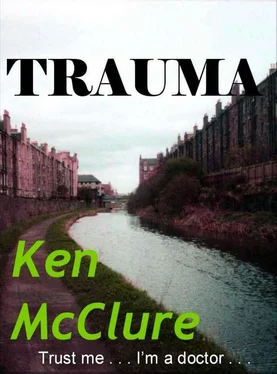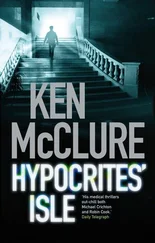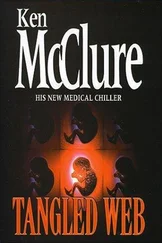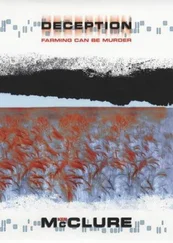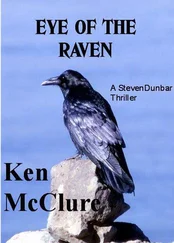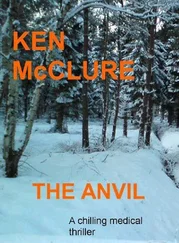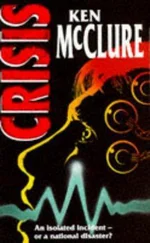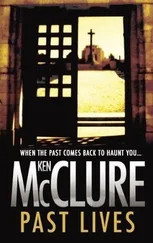Sarah watched Tyndall disappear through the door and collected her thoughts for a few moments before walking through to the duty-room where Sister Roche was sitting at her desk. “Dr Tyndall has just told me about Dr Logan.”
“It’s probably his son,” said Roche without looking up from her papers.
“His son?” asked Sarah, unaware that Logan was married.
Roche put down her pen and said, “He was estranged from his wife. She lives in the south of England with their son. I understand the boy has a kidney problem. He’s been waiting for a transplant for nearly two years.”
“I didn’t know,” said Sarah. Her mind was a sea of confusion. This piece of information explained a lot.
Sarah started to read through the patients’ charts. She glanced up at the clock on the wall and saw that it was just after nine-thirty. She wondered if John Main was on his way to the medical school.
Main checked his pockets to see that he had everything he needed. It was third time he had done so in as many minutes. Satisfied again that his wallet and keys — and a measuring tape, his one stage prop — were where they should be, he left the flat and set off for the medical school.
At ten o’clock on a Tuesday morning the traffic was beginning to thin out a bit after the rush hour but he still experienced a couple of hold ups, both courtesy of the gas board who had dug up the road; in order to drink tea and read newspapers inside Bedford vans, thought Main uncharitably as the final hold up extended to over four minutes. He considered trying to park inside the hospital gates on the grounds that he was there on official business but then decided against it. He had nothing on paper that he could use to convince officialdom. He toured slowly around the neighbouring streets until he found a space being vacated by a delivery van. He noted that waiting was ‘limited to twenty minutes’ in this area but decided to take his chances. If he managed to get what he had come for, the fine would be a small price to pay. He asked at the medical school gate house for directions to the mortuary and was given instructions by a uniformed man who stepped outside in order to add pointing to his verbal directions. Main noticed that he said ‘left’ while his hand pointed to the right but he picked up the general gist of it.
When he finally reached the door with MORTUARY above it, he could find no other instructions. There didn’t seem to be any kind of reception area or office nearby. There was no one around so he tried the handle and the door opened. He stepped inside.
The mortuary was much larger than Main had anticipated but then he realised that he had overlooked the student training aspect of the place. Many of the bodies here would be class material bound for the dissecting tables of first year anatomy and physiology students, perhaps not the noble end their owners had in mind when they had donated their bodies for the furthering of medical research, but necessary all the same.
“Can I help you?” asked a voice.
Main nearly jumped out of his skin. He hadn’t heard anyone come up behind him. He turned to find a small, thin man wearing white overalls with a green plastic apron tied on over them. He was looking at Main through glasses that seemed so thick Main felt they must weigh a kilo. His skin was red as if it had been exposed to the sun for too long but this was Scotland in winter. There had to be a more pathological reason.
“I’m from Magraw and Littlejohn,” said Main. “I’ve come to measure-up Andrew Lamont for his wooden overcoat.”
The eyes behind the glasses stared at him as if he was an insect under a magnifying glass. “Who did you say you were from?”
“Magraw and Littlejohn in Aberdeen,” answered Main.
Another stare but this time the man said, “We’ve got no Lamont here that I know of.” He called out, “Malcolm! Know anything about an Andrew Lamont?”
A second man appeared from an adjoining room. He was wearing the same overalls as the first and was holding a large sewing needle in his hand with what looked a length of plastic thread trailing from it. He had obviously been disturbed in the middle of something. Main preferred not to think what.
“Have you checked the book?” asked the second man.
“No. Thought you might know,” said the first man. He left Main alone while he went off to check and the second man disappeared from sight again. Main started to look around. Most of the bodies would be in the refrigerated body vaults but he was looking for a coffin. There were four in the room, one on the floor in a far corner and three were set out side-by-side on wooden trestles at the end of the row of body vaults. He moved quickly and silently across the room to the one on the floor and saw there was no name-plate on the lid.
He pushed his foot against the side and it moved. It was empty. Just as he was crossing to the other coffins the man with the glasses returned. Once again he did so silently and caught Main unawares. “Big place,” Main said with what he hoped was a disarming smile.
The man with the glasses stared at him again then said, “There’s no one called Lamont in the book.”
“Oh shit,” exclaimed Main. “There must be. You’re not going to tell me I’ve come all this way and there’s some bloody mix up in the paperwork? Someone’s probably forgotten to enter him in the book?”
The man with glasses pointed to the body vaults and said forcibly, “If he was in there I’d know about it. Right?”
Main backed off. He raised his hands, palms outwards and said, “All right, all right, I believe you. But if he’s not here, where the hell is he? Still lying up in the wards? I mean, shit, I can hardly tell my boss that the corpse isn’t here and he’d better get the relations to cancel the funeral can I?”
The man with the glasses thought for a moment and then said, “Wait here.” He went off to confer with his colleague next door. Main decided that there wouldn’t be enough time to examine the other three coffins. He was right. The man with the glasses returned quickly and said, “I’ll go up to the main office and check.”
“I’m obliged to you,” said Main as he watched the man go out through the door. As soon as it closed he hurried silently across to where the three coffins lay on their trestles and examined the first one. There was a brass plate on the lid. It said, Isabella Hartley, born 1910 died 1993. RIP. A paper label, also stuck on the lid, gave the name of the undertakers and the time of collection. Isabella Hartley was to be buried at two thirty that same afternoon.
Main was reading the name on the third coffin and drawing his third blank when the door opened and a man wearing a suit entered. His jacket was open to reveal a gold brocade waistcoat. He was carrying a case about twice the size of a conventional brief-case and had a rolled-up newspaper under his other arm. He saw Main and asked who he was in a tone of voice that suggested he had the right to ask these things. Main told him and explained that there seemed to have been a mix-up in the paperwork over the body he had been sent to measure.
The man frowned and asked, “Who did you say you were here for?”
“Keegan,” replied Main, suddenly deciding to go for broke and improvise. “Martin Keegan.”
“And you say he died in the hospital?”
“Yes.”
“Then why should he be here and not in the hospital mortuary?”
“He had to have some monitoring apparatus removed from him. Sigma probes, I think they were called,” said Main, wondering who his questioner was. His dress and confident manner of speech suggested medical staff. A pathologist perhaps.
“Ah, Sigma probes,” exclaimed the man. “That explains it. He’ll probably still be up in the Sigma lab. They haven’t brought him down yet.”
Читать дальше
